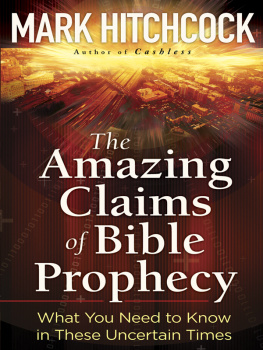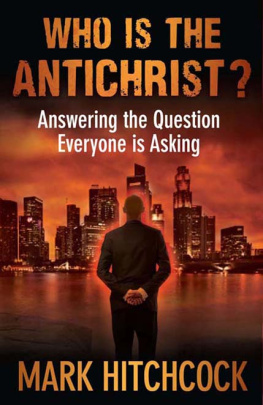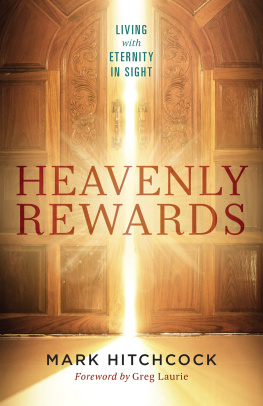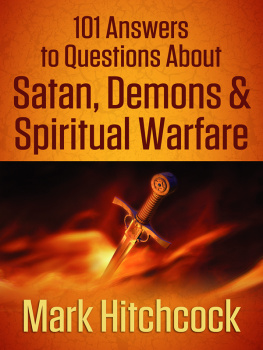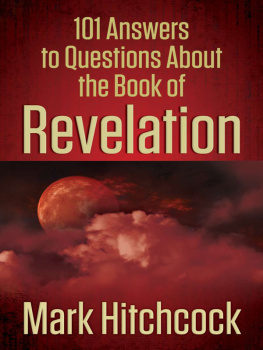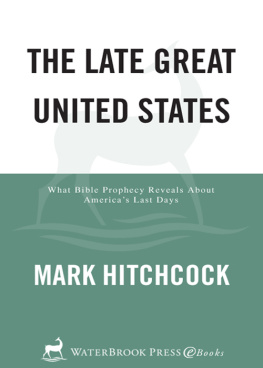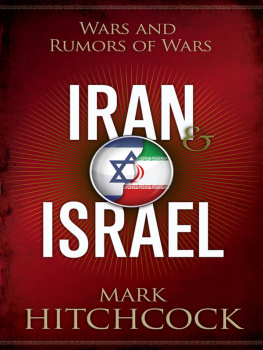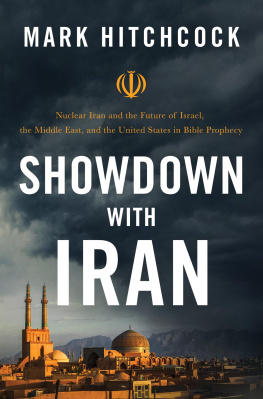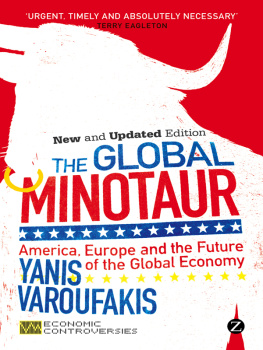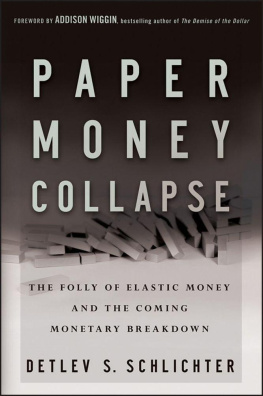

HARVEST HOUSE PUBLISHERS
EUGENE, OREGON
Unless otherwise indicated, all Scripture quotations are taken from the New American Standard Bible, 1960, 1962, 1963, 1968, 1971, 1972, 1973, 1975, 1977, 1995 by The Lockman Foundation. Used by permission. (www.Lockman.org)
Verses marked NLT are taken from the Holy Bible, New Living Translation, copyright 1996, 2004, 2007 by Tyndale House Foundation. Used by permission of Tyndale House Publishers, Inc., Carol Stream, Illinois 60188. All rights reserved.
Cover by Left Coast Design, Portland, Oregon
Cover photo bluecrayola / Shutterstock
Published in association with William K. Jensen Literary Agency, 119 Bampton Court, Eugene, Oregon 97404.
THE END OF MONEY
Copyright 2009, 2013 by Mark Hitchcock
Published by Harvest House Publishers
Eugene, Oregon 97402
www.harvesthousepublishers.com
Formerly titled Cashless .
Library of Congress Cataloging-in-Publication Data
Hitchcock, Mark, 1959-
[Cashless]
The end of money / Mark Hitchcock.
pages cm
Rev. ed. of: Cashless. c2009.
Includes bibliographical references.
ISBN 978-0-7369-5136-4 (pbk.)
ISBN 978-0-7369-5137-1 (eBook)
1. EconomicsReligious aspectsChristianity. 2. Economics in the Bible. 3. BiblePropheciesArmageddon. 4. Finance, PersonalBiblical teaching 5. ArmageddonBiblical teaching. I. Title.
BR115.E3H58 2013
236'.9dc23
2012051518
All rights reserved. No part of this electronic publication may be reproduced, stored in a retrieval system, distributed, or transmitted in any form or by any meanselectronic, mechanical, digital, photocopy, recording, or any otherwithout the prior written permission of the publisher. The authorized purchaser has been granted a non-transferable, non-exclusive, and non-commercial right to access and view this electronic publication and agrees to do so only in accordance with the terms of use under which it was purchased or transmitted. Participation in or encouragement of piracy of copyrighted materials in violation of authors and publishers rights is strictly prohibited.
C ONTENTS
To Justin
You are a wise son who brings untold blessing and joy to my life .
Im proud to be your father .
Chips can be programmed to store monetary value, just like EZ-Pass and Metrocard. If such a chip were implanted in the fleshy part of the palm of the hand, with a wave we could pay highway tolls, pass through subway and bus turnstiles and breeze through the supermarket checkout. Just think of the value to society: no more cash to worry about, or waiting for change, and no more muggings. This is the cashless society we have been dreaming of for years.
J EFFREY O. M ILMAN
The New York Times (June 24, 1999)
Once the smoke clears, I suspect we will find ourselves living in a world of globalization on steroidsa world in which key global economies are more intimately tied together than ever before.
T HOMAS F RIEDMAN
The New York Times
(October 19, 2008)
The headlines stunned us all:
Bailout Nation, Time (September 22, 2008)
Wall Street Financial Meltdown, USA Today (September 30, 2008)
Wall Street Panics; markets lose $1 trillion: Dow plunges 778 points, Washington Times (September 30, 2008)
The Fall of America, Inc., Newsweek (October 4, 2008)
Americas Credit Catastrophe, U.S. News & World Report (October 3, 2008)
The New Hard Times, Time (October 13, 2008)
How Scared Should You Be? U.S. News & World Report (October 3, 2008)
The long-predicted financial meltdown of Americas debt-ridden economy finally arrived in the fall of 2008. The elements of an economic perfect storm converged. The chickens of our casino culture came home to roost. The nightmare on Wall Street finally hit.
Day after day, a cascade of bad news continued to gush forth. We witnessed the near-collapse of the entire investment banking sector and the fall of insurance giant AIG. Fannie Mae and Freddie Mac imploded. Carnage on Wall Street ensued. World markets plunged. For sure, the United States experienced the most serious economic earthquake since the Great Depression, and some even believe these seismic events were on the scale of the 1929 crash. Ive heard it described as Fiscal Armageddon. The fallout was dramatic as we entered uncharted economic waters. All the old financial paradigms were thrown out the window. Even the experts were at a loss over what to do. The aftershocks reverberated through every area of the economy. America as we know it was changed forever. This was the equivalent of an economic 9/11 for America and the world. The word of the year in 2008, according to Merriam-Webster, was bailout . Websters definition for this word is a rescue from financial distress. The oft-repeated joke was that everyones 401(k) had suddenly become a 201(k). Yet we all knew this was no laughing matter.
One Newsweek headline summed up what many were thinking: The Quitter Economy: Companies are liquidating; homeowners are mailing in the keys. Have we given up? (February 2, 2009). In January 2009 alone, 600,000 jobs were lost, making the downturn the worst for unemployment in the post-WWII era. Everyone was asking the same questions: How could this happen? What does it all mean? Where are we headed?
But theres another question lurking in the background that many people may have never considered. What if the global financial chaos is not just a massive economic meltdown but the genesis of a dramatic, tectonic shift toward a global economic system? A system that will ultimately be controlled by one man. A system that will ultimately require all people to be registered and submit to him. What if its the first domino to fall in a chain of events that is setting the stage for the economy of the end times? Such a new world order was foretold by the biblical prophets long ago.
Think Globally
The financial tsunami hit with brutal force and caught many by surprise. Many questions remain unanswered, but one fact became immediately clear: We live in a global economy. Megatrends affect the whole globe simultaneously. In the Internet age, the new economy is more deeply interconnected than ever. It is built on global trade, global capital markets, and global communication. National economies respond to the same forces and rise and fall together. Markets around the world responded immediately to the massive credit crunch in the United States. Precipitous declines struck the markets in Europe, Japan, Russia, and Hong Kong.
As the markets descended into chaos, the governments of the world swung into action to stave off a global financial collapse. This immediately paved the way for greater international cooperation and oversight of the world economy. The nations of the world scrambled for solutions. President Bush visited the headquarters of the 185-nation International Monetary Fund (IMF) and met with G-7 leaders. Treasury Secretary Henry Paulson and Federal Reserve Chairman Ben Bernanke participated in discussions with the Group of 20 or G-20, which is an international organization that includes the leaders of 19 of the worlds biggest national economies, plus the entire European Union (EU). The EU came together in a show of force and unity with proposed solutions to the increasingly shaky global economy. Key nations acted in unparalleled unison to drop interest rates to squeeze some liquidity into world financial markets. There were heightened calls for some kind of international oversight of the worlds banking and financial institutions. Many believe there is a need to create an international financial system that is governed by global regulations and overseen by a global regulator.
Next page

